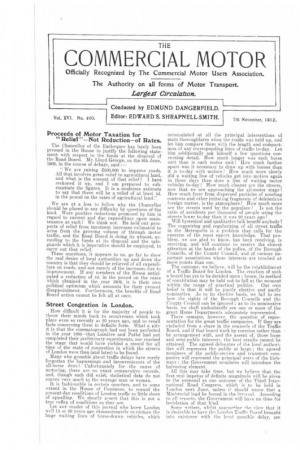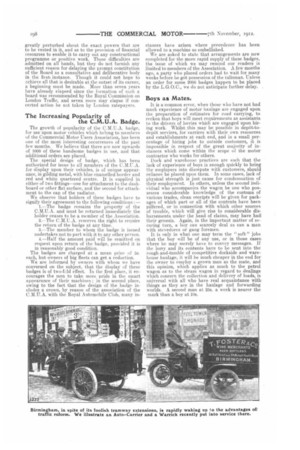Proceeds of Motor Taxation for " Relief "—Not Reduction—of Rates.
Page 1

Page 2

If you've noticed an error in this article please click here to report it so we can fix it.
The Chancellor of the Exchequer has lately been pressed in the House to justify the following statement with respect to the funds at the disposal of the Road Board. Mr. Lloyd George, on the 9th June, 1909, in the course of debate, said :— " We are raising £000,000 to improve roads. All that involves great relief to agricultural land,, and what is the amount of that relief ? I have reckoned it up, and I am prepared to substantiate the figures. It is a moderate estimate to say that there will be a relief of at least 4d. in the pound on the rates of agricultural land:' We are at a loss to follow why the ChancelIor should be placed in any difficulty by questions of the kind. Were positive reductions promised by him in regard to current and due expenditure upon maintenance as such ? We think not. He held out prospects of relief from imminent increases estimated to arise from the growing volume of through motor traffic, and the Road Board is doing its utmost, according to the Funds at its disposal and the safeguards which it is imperative should be employed, to carry out that relief.
These questions, it appears to us, go far to show the real desire of local authorities up and down the country is that they should be relieved of all expenditure on roads, and not merely of the increases due to improvement. If any members of the House anticipated a reduction of 4d. in the pound on the rates which obtained in the year 1909, it is their own political optimism which accounts for their present disappointment. Furthermore, the benefits of Road Board action cannot be felt all at once.
Street Congestion in London.
How difficult it is for the majority of people to throw their minds back to occurrences which took plap.e even so recently as. 20 years ago, and to recall facts concerning them in definite form. What a pity it is that the cinematograph had not been perfected in the year 1892—that Lumiere and Pathe had not completed their preliminary e.xperiments, nor reached the stage that. would have yielded a record for all time of the state of congestion in which the streets of London were then (and later) to be found.
Many who grumble about. traffic delays have surely forgotten the hapnenings and inconveniences of the all-horse days ? Unfortunately for the cause of motoring, there era no exact comparative records.• and, though such did exist, statistical data do not convey very much to the average man or woman.
It is fashionable in certain quarters, and to some extent in the House of Commons. to regard the present-day conditions of London traffic as little short of appalling. We stoutly assert that this is not a true reflex of conditions as they are.
Let any reader of this journal who knew London well 15 or 20 years ago dispassionately re-nicture the huge waiting lines of horse-drawn vehicles, which
accumulated at all the principal intersections of main thoroughfares when the traffic was held up, and let him compare them with the length and compactness of any corresponding lines of traffic to-day. Let him additionally ask himself a few questions conceTing detail. How much longer was each horse unit than is each motor unit? How much farther apart was it necessary to draw up with horses than it is to-day with motors ! How much more slowly did a waiting line of vehicles get into motion again. in those days than does a line of waiting motor vehicles to-day ? How much cleaner are the streets, now that we are approaching the all-motor stage'? flow much freer from dispersed particles of nosebag contents and other irritating fragments of deletericus foreign matter, is the atmosphere'? How much more are the streets used by the populace ? Is not the ratio of accidents per thousand of people using the streets lower to-day than it was 20 years ago ? Will hysterical and qualitative talk benefit anybody ? The organizing and regularizing of all street traffic in the Metropolis is a problem that calls for the exercise of the most expert knowledge. That problem, we are glad to know, has been receiving, is receiving, and will continue to receive the closest attention at the hands of the police, of the Borough Councils, of the County Council, and of various important. associations whose interests are touched at more points than one.
The outcome, we believe, will be the establishment of a Traffic Board for London. The creation of such a board has yet to be decided upon ; hence, its method of constitution may be held not to fall at the moment within the range of practical polities. Our own belief is that it will be partly elective and partly nominative. As to its elective basis, we fail to see how the rights of the Borough Councils and the County Council can be ignored ; as to its nominative basis, we shall undoubtedly see one or more of the great Home Departments adequately represented. There remains, however, the question of representation for the great traflie companies. If they are excluded From a share in the counsels of the Traffic Board, and if that hoard work by coercion rather than by arrangement with, and the assent of, those huge and semi-public interests, the best results cannot be attained. The agreed delegates of the local authorities will represent the public at large ; the agreed nominees of the public-service and transport companies will represent the principal users of the highways; the Government nominees will introduce the balancing element.
All this may take time, but we believe that. the first real impetus of definite magnitude will be given to the proposal as one outcome of the Third. International Road Congress, which is to he held in London next June. unless i+ should prove that a Ministerial lead be Forced in the interval. According to all reports, the Government will have no time for lerishition of that kind.
Some writers, whilst supnorting 'lie view that it is desirable to have the Lordlon Traffic. Roard brought into existence with the least possible delay, are greatly perturbed about the exact powers that are to be vested in it, and as to the provision of financial resources to enable it to carry out any constructional programme or positive work. Those difficulties are admitted on all hands, but they do not furnish any sufficient reason for delaying the prompt constitution of the Board as a consultative and deliberative body in the first. instance. Though it could not hope to achieve all that is desirable at the outset of its career, a beginning must be made. More than seven years have already elapsed since the formation of such a board was recommended by the Royal Commission on London Traffic, and seven more may elapse if concerted action be not taken by London ratepayers.
The Increasing Popularity of
the C.M.U.A. Badge.
The growth of popularity of the C.M.U.A. badge, for use upon motor vehicles which belong to members of the Commercial Motor Users Association, has been one of the most interesting occurrences of the past few months. We believe that there are now upwards of 1000 of these handsome badges in use, and that additional orders are placed. The special design of badge, which has beeo authorized for issue to all members of the C.M.U.A. for display upon their vehicles, is of unique appearance, in gilding metal, with blue enamelled border and red and white quartered centre. It is supplied in either of two fittings—one for attachment to the dashboard or other flat surface, and the second for attachment to the cap of the radiator.
We observe that holders of these badges have to signify their agreement to the following conditions :— 1.—The badge remains the property of the C.M.U.A. and must be returned immediately the holder ceases to be a member of the Association. 2.— The C.M.U.A. reserves the right to require the return of the badge at any time.
3. —The member to whom the badge is issued undertakes not to part with it to any other person.
4.—Half the amount paid will be remitted on request upon return of the badge, provided it is in reasonably good condition.
The badges are charged at a mean price of 5s. each, but owners of big fleets can get a reduction.
We are informed by owners with whom we have conversed on the, subject, that the display of these badges is of two-fold effect. In the first place, it encourages the men to take more pride in the smart appearance of their machines ; in the second place, owing to the fact that the design of the badge includes a crown, by reason of the association of the C.M.U.A. with the Royal Automobile Club, many in
stances have arisen where precedence has been allowed to a machine so embellished.
We are asked to state that arrangements are now completed for the more rapid supply of these badges, the issue of which we may remind our readers is limited to members of the Association. A few months ago, a party who placed orders had to wait for many weeks before he got possession of the talisman. Unless an order for sonle 2000 badges happen to be placed by the L.G.O.C., we do not anticipate further delayc
Boys as Mates.
It is a common error, when those who have not had much experience of motor haulage are engaged upon the preparation of estimates for road carrying, to reckon that boys will meet requirements as assistants to the drivers of lorries which are engaged upon hiring work. Whilst ,this may be possible in depot-todepot services, for carriers with their own resources. and establishments at each end, and in a small percentage of hiring jobs to outside customers, it is impossible in respect of the great majority of instances which come within the scope of the motor. contractor who works for others.
Dock and warehouse practices are such that the lack of experience of boys is enough quickly to bring the employers into disrepute with customers, should reliance be placed upon them. In some cases, lack of physical strength is just cause for condemnation of their employment. In others, unless the second indi-vidual who accompanies the wagon be one who possesses considerable knowledge of the customs of various trades, clean receipts will be given for packages of which part or all of the contents have been pilfered, or in connection with which other sources of trouble, which will give rise to considerable disbursements under the head of claims, may have had their genesis. Again, in the important matter of securing turn, a boy can scarcely deal as can a man with stevedores or gang foremen. It is only in what one may term the "soft" jobs that the boy will be of any use, or in those cases, where he may merely have to convey messages. If the lorry and its contents have to be sent into the rough-and-tumble of competitive dockside and warehouse haulage, it will be much cheaper in the end for the owner to employ a grown man as the mate, and this opinion, which applies as much to the petrol wagon as to the steam wagon in regard to dealings which concern the collection and delivery of loads, is universal with all who have real acquaintance with things as they are in the haulage and forwarding worlds. A second man at 25s. a week is nearer the mark than a boy at 10s.


























